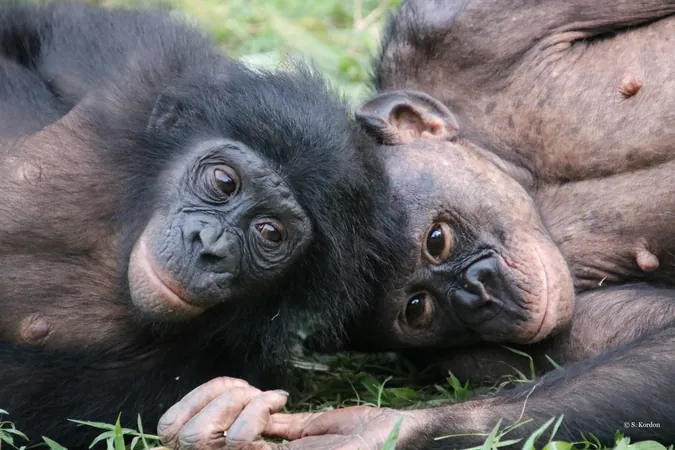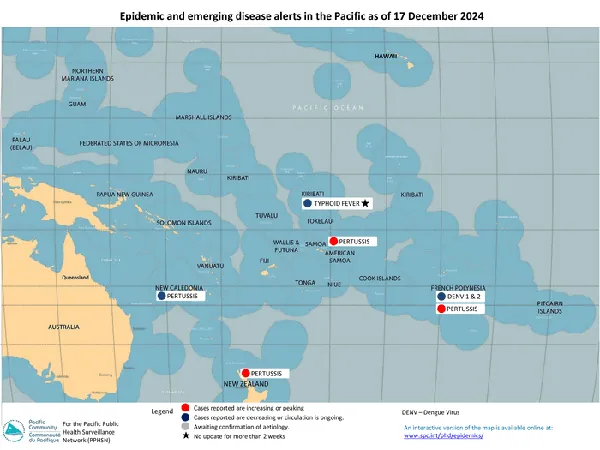
The Incredible Journey of Orphaned Bonobos: How a Unique Sanctuary is Transforming Lives
2024-12-18
Author: Rajesh
Introduction
In a groundbreaking study, researchers have uncovered how orphaned bonobo apes, victims of illegal wildlife trade and bushmeat hunting, are capable of overcoming their traumatic pasts and developing social skills akin to their mother-reared counterparts. The findings, published in the journal *Royal Society Open Science*, shine a vital light on the efforts of the world's sole bonobo sanctuary, Lola ya Bonobo, situated in the Democratic Republic of Congo.
The Critical Threat to Bonobos
Bonobos, our closest living relatives alongside chimpanzees, face a critical threat from habitat destruction and poaching. Losing their mothers can have profound effects on their emotional and social development. The researchers from Durham University, UK, embarked on a decade-long study to assess how rehabilitation efforts at Lola ya Bonobo influence the social and emotional trajectories of these orphaned apes, providing key insights that could revolutionize conservation strategies.
The Study's Evaluation
The core of the study evaluated the empathy, social skills, and aggression behaviors of 83 bonobos under care at different stages of their lives. Despite showing some deficits in social skills compared to mother-reared bonobos, the orphaned apes exhibited species-typical behaviors, suggesting a resilient capacity for social interaction.
Importance of Rehabilitation
Lead researcher Stephanie Kordon emphasized the importance of rehabilitation, stating, 'While the orphans' social development is not exactly comparable to that of their mother-reared peers, they demonstrate overlapping behaviors that signify their potential to reintegrate into society.' The team’s observations revealed notable differences in social dynamics based on gender; specifically, female bonobos’ social skills improved over time, while male bonobos showed a decline, aligning with the female-led structure of bonobo society.
Resilience of Orphaned Bonobos
Perhaps most intriguingly, while orphaned bonobos displayed less empathy—evidenced by a reduced likelihood to comfort fellow apes—the potential for these behaviors was not completely extinguished. This resilience is critical, as many of these orphans are candidates for eventual reintroduction into the wild, where strong social bonds are essential for survival.
Concluding Remarks
Professor Zanna Clay, a senior author on the research, remarked, 'Although we cannot classify these orphaned bonobos as fully rehabilitated, their behaviors indicate a positive trajectory in social functioning. This research provides a fascinating glimpse into how early experiences shape the emotional and social skills of our closest relatives.'
The international collaboration behind this research also included experts from Harvard University and Emory University, underscoring the global importance of protecting these incredible animals.
A Call to Action
As illegal wildlife trade continues to threaten bonobos and their habitats, the work at Lola ya Bonobo serves as a beacon of hope. With continued support and understanding of their social needs, orphaned bonobos may not only recover from their traumatic experiences but also reclaim their rightful place in the wild. This sanctuary stands as a testament to the resilience of nature and the vital role rehabilitation plays in conservation efforts.
Will you be one of the voices fighting for the protection of these remarkable creatures? The call to action is clear—every effort counts!




 Brasil (PT)
Brasil (PT)
 Canada (EN)
Canada (EN)
 Chile (ES)
Chile (ES)
 España (ES)
España (ES)
 France (FR)
France (FR)
 Hong Kong (EN)
Hong Kong (EN)
 Italia (IT)
Italia (IT)
 日本 (JA)
日本 (JA)
 Magyarország (HU)
Magyarország (HU)
 Norge (NO)
Norge (NO)
 Polska (PL)
Polska (PL)
 Schweiz (DE)
Schweiz (DE)
 Singapore (EN)
Singapore (EN)
 Sverige (SV)
Sverige (SV)
 Suomi (FI)
Suomi (FI)
 Türkiye (TR)
Türkiye (TR)